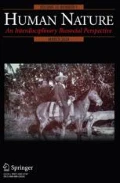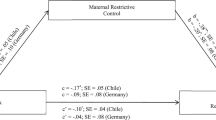Abstract
The majority of adaptationist models and research related to parenting strategies have focused on extrinsic or population-level risk as predictors of parenting. However, some researchers have called for greater consideration of cultural factors as well as on intracultural variation in parenting. This study uses a biocultural approach to examine intracultural variation in environmental risk and parenting among the Bofi foragers in Central Africa. In particular, we examine 30 mothers’ experiences of child loss as a predictor of variation in maternal involvement (proximity, holding, and affection) with their young children. Multivariate and univariate analyses indicate that child loss accounted for substantial variation in maternal behaviors and was predictive of maternal holding and the expression of physical affection. In sum, our findings indicate that intracultural variation in child loss is predictive of maternal involvement with young children and that a biocultural approach is useful in explaining this variation.



Similar content being viewed by others
References
Altmann, J. (1974). Observational study of behavior: sampling methods. Behavior, 49, 227–267.
Belsky, J., Steinberg, L., & Draper, P. (1991). Childhood experience, interpersonal development, and reproductive strategy: an evolutionary theory of socialization. Child Development, 62, 647–670.
Belsky, J., Schlomer, G. L., & Ellis, B. J. (2012). Beyond cumulative risk: distinguishing harshness and unpredictability as determinants of parenting and early life history strategy. Developmental Psychology, 48, 662–673.
Blurton Jones, N. (2002). The lives of hunter-gatherer children: Effects of parental behavior and parental reproductive strategy. In M. E. Pereira & L. A. Fairbanks (Eds.), Juvenile primates: Life history, development, and behavior (pp. 309–326). Chicago: University of Chicago Press.
Buckle, J. L., & Fleming, S. J. (2011). Parenting after the death of a child: A practitioner’s guide. New York: Brunner-Routledge.
Chisholm, J. S. (1993). Death, hope, and sex: life-history theory and the development of reproductive strategies. Current Anthropology, 34, 1–24.
Cohen, J. (1988). Statistical power analysis for the behavioral sciences (2nd ed.). New York: Academic.
Draper, P., & Harpending, H. (1982). Father absence and reproductive strategy: an evolutionary perspective. Journal of Anthropological Research, 38, 255–273.
Ellis, B. J., Figueredo, A. J., Brumbach, B. H., & Schlomer, G. L. (2009). Fundamental dimensions of environmental risk. Human Nature, 20, 204–268.
Fouts, H. N., & Brookshire, R. A. (2009). Who feeds children? A child’s-eye-view of caregiver feeding patterns among the Aka forgers in Congo. Social Science and Medicine, 69, 285–292.
Fouts, H. N., & Lamb, M. E. (2005). Weanling emotional patterns among the Bofi foragers of Central Africa: The role of maternal availability and sensitivity. In B. S. Hewlett & M. E. Lamb (Eds.), Hunter-gatherer childhoods: Evolutionary, developmental, and cultural perspectives (pp. 309–321). New Brunswick: Transaction.
Fouts, H. N., Hewlett, B. S., & Lamb, M. E. (2005). Parent-offspring weaning conflicts among the Bofi farmers and foragers of Central Africa. Current Anthropology, 46, 29–50.
Fouts, H. N., Hewlett, B. S., & Lamb, M. E. (2012). A biocultural approach to breastfeeding interactions in central Africa. American Anthropologist, 114, 123–136.
Goodman, A. H. (2013). Bringing culture into human biology and biology back into anthropology. American Anthropologist, 115, 359–373.
Hewlett, B. S., & Lamb, M. E. (2002). Integrating evolution, culture, and developmental psychology: Explaining caregiver-infant proximity and responsiveness in Central Africa and the USA. In H. Keller, Y. H. Poortinga, & A. Schölmerich (Eds.), Between culture and biology: Perspectives on ontogenetic development (pp. 241–269). New York: Cambridge University Press.
Hewlett, B. S., Lamb, M. E., Leyendecker, B., & Schölmerich, A. (2000). Parental investment startegies among Aka foragers, Ngandu farmers, and Euro-American urban-industrialists. In L. Cronk, N. Chagnon, & W. Irons (Eds.), Adaptation and human behavior: An anthropological perspective (pp. 155–177). New York: Aldine de Gruyter.
Klass, D. (2001). The inner representation of the dead child in the psychic and social narratives of bereaved parents. In R. A. Neimeyer (Ed.), Meaning reconstruction and the experience of loss (pp. 77–94). Washington, DC: American Psychological Association.
Konner, M. (2005). Hunter-gather infancy and childhood: The !Kung and others. In M. E. Lamb & B. S. Helwtt (Eds.), Hunter-gatherer childhoods: Evolutionary, developmental, and cultural perpsectives (pp. 19–64). New Brunswick: Transaction.
Lawson, D. W., Alvergne, A., & Gibson, M. A. (2012). The life-history trade-off between fertility and child survival. Proceedings of the Royal Society B: Biological Sciences, 279(1748), 4755–4764.
LeVine, R. A. (1980). A cross-cultural perspective on parenting. In M. Fantini & R. Cardenas (Eds.), Parenting in a multicultural society. New York: Longman.
Nettle, D. (2010). Dying young and living fast: variation in life history across English neighborhoods. Behavioral Ecology, 21, 387–395.
O’Leary, J., & Warland, J. (2012). Intentional parenting of children born after a perinatal loss. Journal of Loss and Trauma, 17, 137–157.
Pennington, R., & Harpending, H. (1988). Fitness and fertility among Kalahari !Kung. American Journal of Physical Anthropology, 77, 303–319.
Quinlan, R. J. (2007). Human parental effort and environmental risk. Proceedings of the Royal Society B: Biological Sciences, 274, 121–125.
Quinlan, R. J. (2010). Extrinsic mortality effects on reproductive strategies in a Caribbean community. Human Nature, 21, 124–139.
Rosenblatt, P. C. (2000). Protective parenting after the death of a child. Journal of Personal and Interpersonal Loss, 5, 343–360.
Rubin, S. S., & Malkinson, R. R. (2001). Parental responses to child loss across the life cycle: Clinical and research perspectives. In M. S. Strobe, R. O. Hansson, W. Stroebe, & H. Schut (Eds.), Handbook of bereavement research: Consequences, coping, and care (pp. 219–240). Washington, DC: American Psychological Association.
Sellen, D. W., & Smay, D. B. (2001). Relationship between subsistence and age at weaning in “preindustrial” societies. Human Nature, 12, 47–87.
Warland, J., O’Leary, J., McCutcheon, H., & Williamson, V. (2011). Parenting paradox: parenting after infant loss. Midwifery, 27, e163–e169.
Wilson, M., & Daly, M. (1997). Life expectancy, economic inequality, homicide, and reproductive timing in Chicago neighbourhoods. British Medical Journal, 314, 1271–1274.
World Health Organization (2013) Children: Reducing mortality (Fact Sheet No178). Retrieved from http://www.who.int/mediacentre/factsheets/fs178/en/
Acknowledgments
We are deeply grateful to the Bofi forager people for generously sharing their stories and enduring the long observations. We thank the government of the Central African Republic for authorizing this research. We also appreciate helpful comments from Brian Barber and Priscilla Blanton on an earlier draft of this paper and guidance from Barry Hewlett and Michael Lamb that informed this study. This research was supported by the Intramural Research Program at the National Institute of Child Health and Human Development.
Author information
Authors and Affiliations
Corresponding author
Rights and permissions
About this article
Cite this article
Fouts, H.N., Silverman, L.S. Parenting and Environmental Risk. Hum Nat 26, 73–88 (2015). https://doi.org/10.1007/s12110-015-9221-z
Published:
Issue Date:
DOI: https://doi.org/10.1007/s12110-015-9221-z




